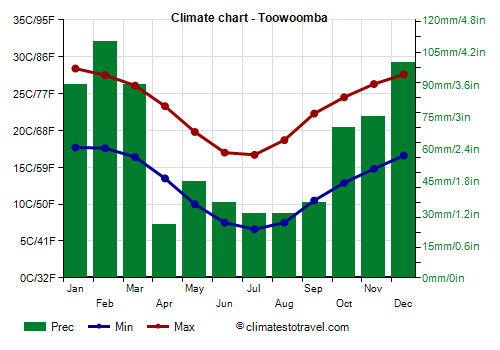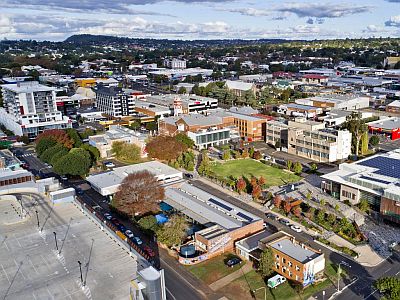Select units of measurement for the temperature and rainfall tables (metric or imperial).
Average weather, temperature, rainfall, sunshine hours

The climate of Toowoomba is
humid subtropical, with very mild winters (from June to August) and warm, rainy summers (from December to March). Being in the southern hemisphere, the seasons are reversed compared to the northern hemisphere.
The city is located in eastern Australia, in Queensland, at an altitude of 600 meters (1,970 ft) and 100 km (62 mi) west of Brisbane, the state capital. We are in the region called Darling Downs.

Toowoomba is the second largest Australian city located away from the coast after Canberra, and like the latter, it is located at an altitude of 600 meters.
In periods of good weather, at night and in the early morning,
fog can form.
The altitude cools the climate slightly, although this is offest by the distance from the sea and the closer proximity to the desert, so temperatures in summer are similar to those of Brisbane.
However, the climate in Toowoomba is colder than in the rest of Queensland, and is second only to Stanthorpe, which is further south at 800 meters (2,600 ft). In particular, during outbreaks of
cold air, the temperature can drop to about 0 °C (32 °F) from late May to late August. The coldest record is -4.4 °C (24 °F) and was set in July 1965.
Occasionally it can even
snow. In July 1984 there was a snowfall with an accumulation of 10 centimeters (4 in), while in June 2007 and July 2015 there were short snowfalls.
Even in summer, there can sometimes be cool days, with highs of 20 °C (68 °F) or even below.
On the other hand, air masses from the desert can also arrive here, and from October to March, it can sometimes get
very hot, in fact the temperature can exceed 35 °C (95 °F). From December to February it can even reach 38/40 °C (100/104 °F).
In summer,
thunderstorms can break out, sometimes accompanied by hail.
Although the city is located far from the coast, from January to March it can occasionally be affected by the remnants of a
tropical cyclone. This rarely happens also because cyclones usually pass further north, beyond the Tropic.
Best Time
To visit Toowoomba you can choose autumn, from April to mid-May, and spring, from September to mid-October. In winter it can sometimes get cold, while in summer it is rains more, in addition, it can sometimes get very hot, although it depends on the periods.
Toowoomba - Climate data
In Toowoomba, the
average temperature of the coldest month (July) is of
11.6 °C, that of the warmest month (January) is of
23 °C. Here are the average temperatures.
Toowoomba - Average temperatures (1996-2020) |
| Month | Min | Max | Mean |
|---|
| January | 17.7 | 28.4 | 23 |
|---|
| February | 17.6 | 27.5 | 22.6 |
|---|
| March | 16.4 | 26.1 | 21.2 |
|---|
| April | 13.5 | 23.3 | 18.4 |
|---|
| May | 10 | 19.8 | 14.9 |
|---|
| June | 7.5 | 17 | 12.2 |
|---|
| July | 6.6 | 16.7 | 11.6 |
|---|
| August | 7.5 | 18.7 | 13.1 |
|---|
| September | 10.5 | 22.3 | 16.4 |
|---|
| October | 12.9 | 24.5 | 18.7 |
|---|
| November | 14.8 | 26.3 | 20.6 |
|---|
| December | 16.6 | 27.6 | 22.1 |
|---|
| Year | 12.6 | 23.2 | 17.85 |
|---|
amounts to
735 millimeters per year: so, it is at an intermediate level. It ranges from
25 millimeters in the driest month (April) to
110 millimeters in the wettest one (February). Here is the average precipitation.
Toowoomba - Average precipitation| Month | Days |
|---|
| January | 90 | 8 |
|---|
| February | 110 | 8 |
|---|
| March | 90 | 8 |
|---|
| April | 25 | 4 |
|---|
| May | 45 | 5 |
|---|
| June | 35 | 5 |
|---|
| July | 30 | 4 |
|---|
| August | 30 | 4 |
|---|
| September | 35 | 4 |
|---|
| October | 70 | 7 |
|---|
| November | 75 | 6 |
|---|
| December | 100 | 8 |
|---|
| Year | 735 | 69 |
|---|